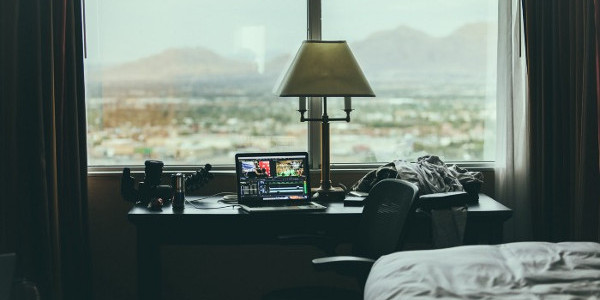Working remote from a hotel?
Here’s what you need to be aware of
Remember the days when “normal” was to sit at your office desk, sip your morning flat-white with oat milk whilst going through e-mails, have an uninterrupted call, and take all of this for granted? It seems the chance to get it back is just around the corner - at least in Germany where hotels are converting their rooms into offices. Personal room, quiet from spouses, kids, and pets giving you the luxury to devote your time exclusively for work. Too good to be true?

Actually, yes. As great as it sounds, such an amazing idea has some soft spots to be taken into consideration. One of those is a highly flawed and vulnerable WiFi infrastructure. Presumably, the hotels-turned-into-office spaces are still using the same system, access points, and WiFi as they did before when their guests mainly spent their leisure time at a hotel. Many people incorrectly think that the WiFi password is more than enough to ensure the safety of the network, but it’s not - if the network is only protected by WiFi easily accessible to a fair amount of users (in this case - all of the people renting hotel rooms), it is exposed to the risks as follows:
- Using free guest WiFi, your browsing history can be easily tracked. It’s not that everything you do on your screen can be seen, but each website you open can be skimmed and used for malicious purposes. Considering that you’re renting a hotel room as an office, you are likely to work with high-value sensitive data. Even if it’s been put into a cloud, using unsafe - e.g. unencrypted - WiFi puts your data at great risk.
- If you’re connected to a public WiFi, a hacker can identify the device you’re using and this is even more dangerous: this knowledge allows him or her to look for (and find, for that matter), your device’s weak spots. Then the hacker can get into your device and steal your files or even install harmful software.
- Another risk is widely known as “man in the middle” attack. In this case, such an attack means that a third party can make a fake access point — an imposter WiFi network with the same name and password as the real one. When a person connects to a network like this, he or she gives the hacker access to their data stream. The follow-up of such a breach might result in stolen files, folders, usernames, passwords, and in the worst scenario - the complete system takeover.
- Keep in mind that captive portals, often asking for a particular access code, like a hotel number, are not any safer. This code doesn’t mean the WiFi is encrypted and secure, it gives a false sense of security rather than a real favor.
After reading this you might think that it’s probably safer to stay at home — both for your health and your digital data. However, solutions for the risks listed above are out there and here’s what you can use to make sure you’re protecting your online privacy:
- Use VPN software in your device. VPN technology encrypts the WiFi despite what kind of WiFi you’re using — even if it’s a public one. That way your information is protected from skimming and breaches. Just be sure to install your VPN before using any public WiFi and download it using the secure network.
- Look for hotels that care about guests’ cybersecurity and use enterprise-grade WiFi solutions. At such places, each guest gets a unique username and password combination to log in to WiFi. This type of technology ensures that a person sitting in the next room is not able to see your WiFi traffic.
- You can use both VPN and personal WiFi login and make your data traffic super secure.
- You can always use a hot–spot from your mobile phone or portable 4G station, which also ensures secure WiFi.